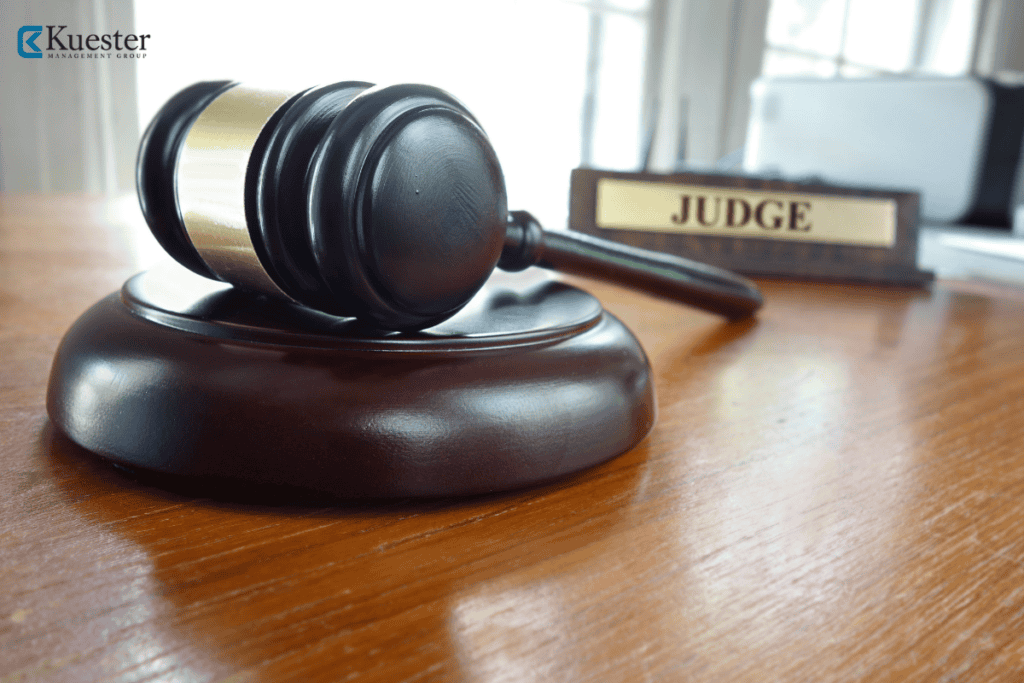Contents
Are you an HOA board member wondering, “Could I personally be sued for my decisions?”
Of course, it’s a valid concern–and you’re not the first board of directors’ member to have this worry.
Ultimately, the idea of facing personal liability or legal action can be daunting, but understanding when and why board members might be at risk can help you navigate these responsibilities with confidence.
In this blog, we’ll break down common reasons why HOA board members get sued, explain the legal protections available to you, and highlight how working with a professional management company can significantly reduce your liability. Kuester Management Group has helped many HOA board members understand legal protections as a leading provider of professional HOA management in Charlotte, Huntersville NC, Wilmington NC, Myrtle Beach SC, and Fort Mill SC.
Can Individual Board Members Really Be Sued? Here’s What You Need to Know
Yes, individual board members can be sued–but it’s not as simple as one wrong move leading straight to court.
In most cases, legal action is brought against the HOA as an entity, not the people on the board.
However, there are situations where individual board members may be named in a lawsuit, especially if they’re accused of acting outside their authority, violating their fiduciary duties, or engaging in misconduct.
This doesn’t mean you should stress, panic, or step down, though. Serving on a board doesn’t have to be risky if you understand the boundaries of your role and take steps to protect yourself. Good faith efforts, following procedures, and sticking to your governing documents all go a long way toward reducing personal exposure and facing legal action.
The good news? There are built-in legal protections–and professional support options–to help you do your job confidently and without fear or personal ruin.
Common Reasons Individual HOA Board Members Get Sued
While most board members serve with integrity and good intentions, certain actions–or inaction–can open the door to legal trouble. Here are the most common reasons individual board members may face lawsuits or risk personal liability:
Breach of Fiduciary Duty
Board members are legally obligated to act in the best interests of the community association board. When they engage in wrongful conduct, they risk personal liability.
- Misuse of funds, such as careless budgeting or misuse of reserves.
- Making bad faith decisions that benefit themselves or select homeowners rather than the entire community.
- Failing to act when issues clearly need attention.
Discrimination and Unfair Enforcement of Rules
Fair housing laws require consistent, unbiased treatment of residents.
- Selectively enforcing community rules based on personal biases.
- Refusing accommodations for disabilities.
- Using language or actions that could be interpreted as discriminatory.
Fraud, Embezzlement, and Financial Mismanagement

Even the appearance of financial wrongdoing with association funds can lead to legal trouble.
- Using Homeowners Associations funds for personal benefit.
- Hiding financial information from homeowners.
- Creating or approving false financial records.
Failure to Maintain Common Areas
Neglecting shared spaces can cause property damage–or worse, personal injury.
- Ignoring safety hazards like broken sidewalks or poor lighting.
- Failing to address maintenance requests or inspections.
Defamation, Harassment, or Abuse of Power
Board members must treat all homeowners with respect and professionalism.
- Making public accusations or inappropriate comments that lead to disgruntled homeowners.
- Using their position to intimidate or retaliate.
- Micromanaging in ways that exceed their authority.
Understanding these risks is the first step to avoiding them–and staying legally protected.
Legal Protections That Help Safeguard HOW Board Members
Serving on an HOA board comes with responsibility–but also with protection. While individual board members can be sued, several legal safeguards exist to defend those who act responsibly and in good faith.
Business Judgment Rule
This rule is one of the strongest protections for board members.
- It shields individuals from liability when decisions are made in good faith, with reasonable care, and within their authority.
- Even if a decision turns out poorly, a board member isn’t liable as long as the process followed was sound and informed.
- The key is documentation–showing that decisions were made thoughtfully and not recklessly or in bad faith.
Indemnification by the HOA
Most HOA bylaws include indemnification clauses.
- These clauses mean the HOA agrees to defend and cover legal costs for board members who are sued for actions taken as part of their duties.
- Indemnification typically applies when the board member did not act with gross negligence or willful misconduct.
- It provides peace of mind and financial protection when legal claims arise.
Directors and Officers (D&O) Insurance
D&O insurance adds an extra layer of defense.
- It covers legal fees, settlements, and other costs associated with lawsuits against individual board members.
- Insurance policies typically protect against claims of mismanagement, breach of duty, and other board-related decisions.
- It’s essential for any HOA, regardless of size or location, to carry this insurance coverage.
Together, these protections help board members lead with confidence, knowing they won’t be left exposed for doing their jobs.
Practical Ways HOA Board Members Can Protect Themselves
Being on an HOA board doesn’t have to mean worrying about lawsuits at every turn. By taking some smart, proactive steps, individual board members can significantly reduce their legal risk–and focus more on serving the community.
Follow Governing Documents and State Laws
- Always stick to what the HOA’s governing documents say–bylaws, CC&Rs, and community rules exist for a reason.
- Know your state’s HOA laws, too. Regulations can vary widely by state, and staying compliant is critical.
Maintain Transparency in Decisions and Finances
- Keep clear, written records of board meetings, decisions, and financial transactions.
- Communicate openly with homeowners. When people feel informed, they’re less likely to become a disgruntled homeowner.
- Transparency builds trust and makes it easier to defend board actions if ever challenged.
Treat Homeowners Fairly and Enforce Rules Consistently
- Apply all rules equally to every homeowner–no exceptions, no favoritism.
- Unequal treatment can lead to claims of discrimination, so consistency is your best protection.
Work with Legal Counsel and HOA Management Companies
- Don’t go it alone. An attorney can offer guidance when decisions have legal implications.
- Partnering with an experienced HOA management company like Kuester ensures that your board is following best practices, meeting legal requirements, and making sound, defendable decisions.
These habits aren’t just smart–they’re key for protecting the board and strengthening your entire community.
Reducing Risk with the Right Partner
Serving on an HOA board comes with serious responsibility–but you don’t have to shoulder it by yourself. Kuester Management Group works alongside boards to help limit liability and strengthen community leadership.
- Expert HOA Governance Consulting: Kuester helps board members clearly understand their roles, legal obligations, and boundaries of authority.
- Policy Creation and Enforcement: From rulemaking to enforcement, Kuester ensures that all policies align with local, state, and federal laws–reducing the risk of legal missteps.
- Access to Legal Resources and Risk Management Strategies: Boards get guidance on navigating disputes, handling compliance issues, and implementing risk prevention strategies before problems arise.
- Financial Management Services: With professional budgeting, reserve planning, and dues collection, Kuester minimizes financial errors that could lead to liability.
In short, Kuester doesn’t just support your operations–we protect your board. For more information about how we can assist you as your strategic partner, reach out to our team today.
FAQs
- Under what circumstances can an HOA board member be sued?
Board members can be sued for actions like breaching fiduciary duty, discrimination, financial mismanagement, or failing to maintain common areas. - Can board members be held personally liable for HOA decisions?
Yes, if they act outside their authority, violate laws, or fail to uphold their fiduciary duties, they could face personal liability. - Does homeowners insurance cover lawsuits against HOA board members?
No, homeowners insurance typically does not cover legal actions taken against HOA board members. - What is D&O insurance, and does my HOA need it?
Directors and Officers (D&O) insurance protects board members from personal financial liability and is highly recommended for all HOAs. - How can hiring an HOA management company like Kuester help protect board members?
Kuester provides governance guidance, legal compliance support, and financial oversight to help board members reduce risk and avoid lawsuits.

